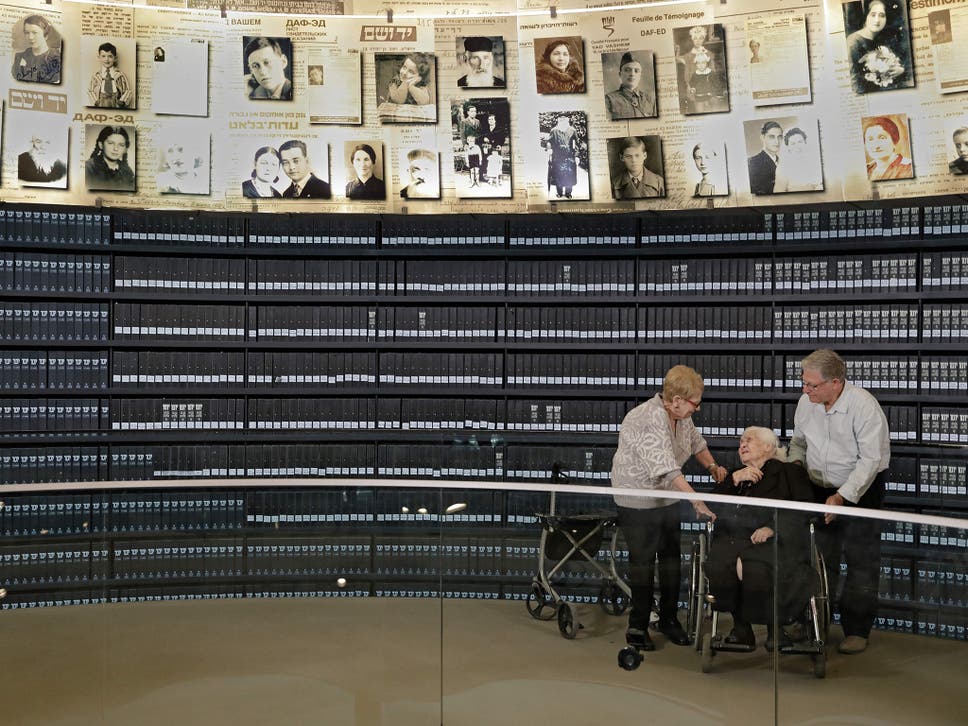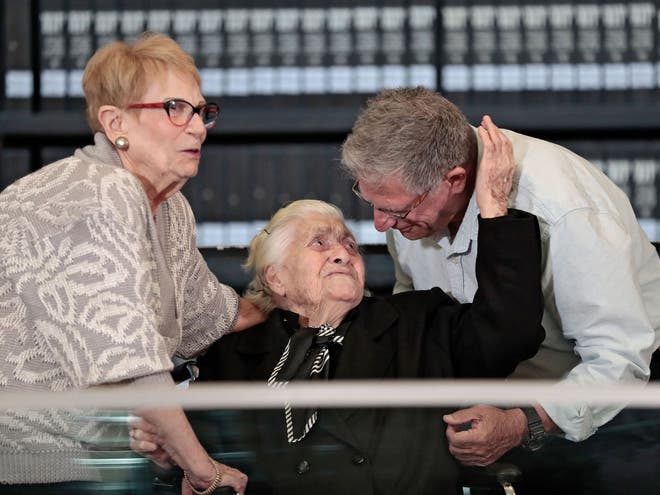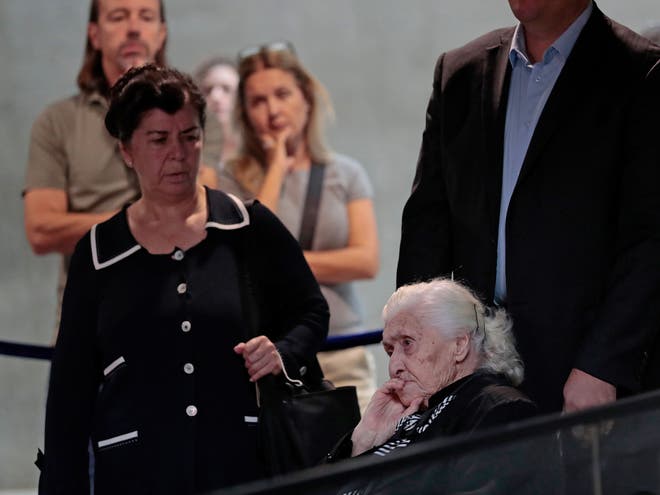|
Schnurmacher: How my mother's vanity saved her in Auschwitz Schnurmacher: How my mother's vanity saved her in Auschwitz

Sarah Yanai, an 86-year-old Holocaust survivor, clutched the handle of her wheelchair as she closed her eyes, and then opened her arms to embrace the woman who helped save her and most of her family from the Nazis more than 75 years ago. “How are you, how are you, Melpo?” Ms Yanai asked in Greek while stroking the cheek and silver hair of Melpomeni Dina. Ms Dina, along with her two sisters, provided a hiding place for Ms Yanai’s family in Veroia, a town in northern Greece, during the German occupation of the country in World War II. The two women and Yossi Mor, Ms Yanai’s brother, were reunited at Yad Vashem, Israel’s Holocaust memorial centre. The meeting, which was set up by the centre and by the Jewish Foundation for the Righteous, a charity that assists those who risked their lives to save Jews. Stanlee J Stahl, the executive vice president of the foundation, said it might be the last of its kind. “I believe this will be the very last reunion,” Stahl explained, noting that most survivors and the people who had helped them were either unable to travel or had died. Ms Dina, who was accompanied to Jerusalem by her daughter, was introduced to 40 descendants of the Jewish family she had helped to shelter in a bedroom in Veroia in the 1940s, according to a statement by foundation. “Everyone is here; they are all waiting to meet you, to tell you that they thank you very much,” Ms Yanai told her saviour. “We are a large family now; we are all here.” One by one, members of the Jewish family, middle-aged offspring through to young children, embraced Ms Dina, who now uses a wheelchair. “We were hiding in her house — she saved all my family,” said Ms Yanai, whose family name at the time was Mordechai. “Thanks to her, now she can see all our large family.” The Mordechais — five children, including Ms Yanai and Mr Mor, and their parents, Mentes Mordechai and Miriam Mari — owned a fashion business, according to Yad Vashem.
In March 1943, when Jews in Thessaloniki, Greece’s second-largest city, started being rounded up for deportation, the brother of a Greek maid for the Mordechai family helped them try to avoid detection. But the maid’s brother soon found out that a roundup of Jews in Veroia was imminent. He hid the seven members of the family in his attic for almost a year, but, when the family developed health problems because of their cramped conditions, a new hiding place was needed. Nelly Sachs: Who was the poet who escaped Nazi Germany and recorded the horror of the Holocaust in verse? That is where the Giannopoulou sisters — the family name of Ms Dina — came in. Before the war, Efthimia, her elder sister, had trained as a seamstress at Mordechai’s studio. Because the sisters were orphans and very poor, Ms Mordechai had not charged Efthimia for lessons. Efthimia, who had visited the Mordechai family in their first shelter, wanted to repay the kindness.
So she, along with Bethleem, her sister, and Ms Dina, then 14, decided to provide refuge for the family — lodging them all in one room and sharing their food rations. “They had to share the food that they got for themselves,” said Mr Mor, who is now 77 but who was a baby at the time. “We were more than they were, you see,” he added. While the family lived with the Giannopoulou sisters, Shmuel, one of the Mordechais’ sons, fell ill. He was taken to the hospital by one of the sisters, but he died, and soon after, the family was reported to authorities. The sisters helped them escape and provided them with clothes for hiding in the Vermio Mountains in northern Greece. “You cannot imagine how dangerous it was for her, for all her family, to keep us all, our family, with them,” Ms Yanai said of Ms Dina. Both the families that sheltered the Mordechais during the German occupation were recognised as Righteous Among the Nations by Yad Vashem and the State of Israel. More than 27,000 people have been recognised to date — 355 of whom were from Greece, according to Yad Vashem. Ms Dina, whose two sisters have since died, was recognised in 1994. She and other honorees are given financial support “as an expression of gratitude on behalf of the Jewish people”, the centre and the foundation said in a statement. About six million European Jews were killed by the Nazis and their associates during World War II. “My mother and her sisters were young orphan girls, and they had no awareness of danger,” Margarita, Ms Dina’s daughter, told the Athens-Macedonian News Agency, adding that the three of them had helped the Mordechai family with any means they had. “What my mother says is that she has a clear conscience,” she added.
|
|
|




